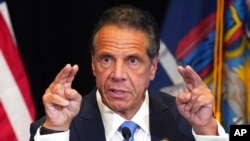New York state Governor Andrew Cuomo sexually harassed numerous women in violation of federal and state laws, according to a report released Tuesday by New York’s attorney general, allegations that he vehemently denied.
Letitia James said Cuomo allegedly targeted 11 current and former employees of the state government.
The probe uncovered a “climate of fear” created by Cuomo’s behavior that included unwanted kisses, groping, hugging, and making unacceptable remarks, said James.
She said the investigation also found that the Democratic governor retaliated against at least one former employee for complaining about his actions.
At a news conference in Albany, Cuomo denied any wrongdoing, declaring, “I never touched anyone inappropriately," adding, “That is just not who I am and that's not who I have ever been.”
The nearly five-month investigation was performed by two outside attorneys whom the state attorney general hired. They spoke to 179 people, including complainants, current and former members of the governor’s office, state troopers, and other state workers.
James said the probe was launched because of the “heroic women who came forward.”
Shortly after the report’s release, several of Cuomo’s accusers demanded that he resign immediately, including Charlotte Bennett, who tweeted, “Resign, @NYGovCuomo.”
The report is expected to be taken into account in an ongoing investigation by the state legislature into whether there are reasons for Cuomo to be impeached.
New York Assembly Speaker Carl Heastie, who authorized the investigation, was one of a growing chorus of state lawmakers calling for Cuomo’s resignation on Tuesday. He said in a statement the report's findings point to "someone who is not fit for office.”
New York’s U.S. Senators, Democrats Chuck Schumer and Kirsten Gillibrand, have been calling for him to step down since last winter. Gillibrand reiterated her demand Tuesday at a news conference in Washington.
The legislature is also investigating the assistance Cuomo received from top aides to write a book about the coronavirus pandemic, preferential treatment his relatives received during COVID-19 testing last year, and his administration’s decision not to publicly disclose some data relating to nursing home fatalities for several months.












